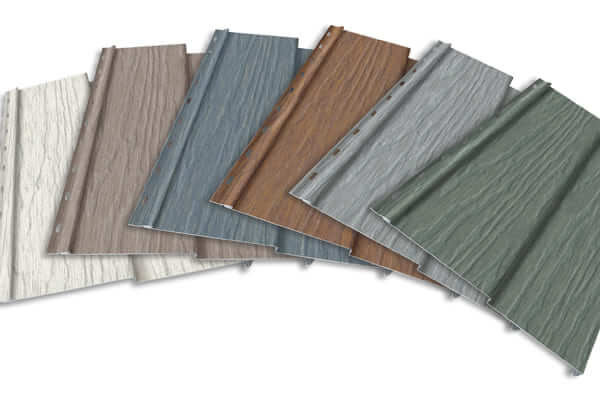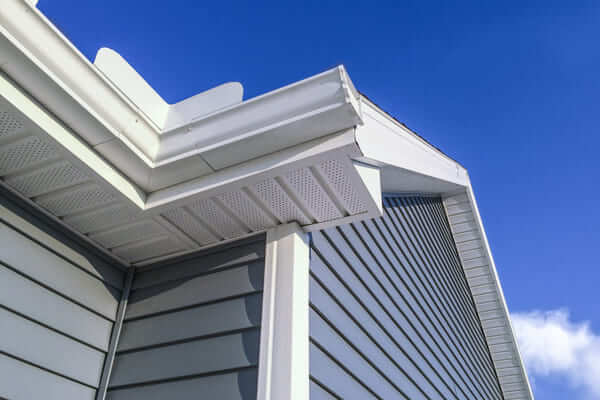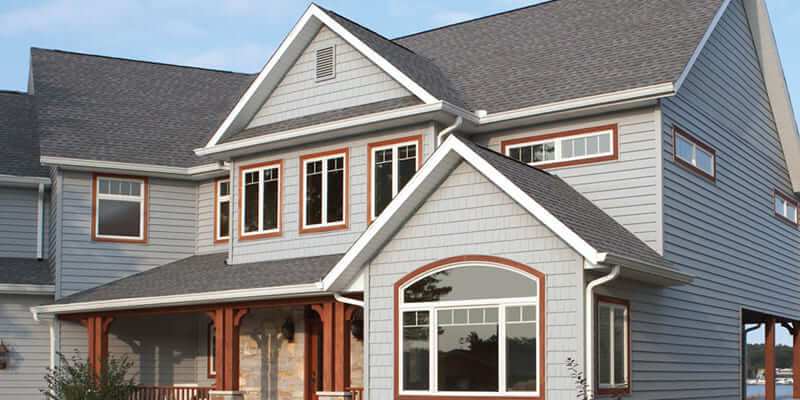Aluminum siding is a type of exterior cladding or covering used on the outer walls of buildings for protection and aesthetic purposes. It is made from sheets of aluminum that are formed into panels and designed to cover the exterior surface of a structure.
Aluminum siding is a type of exterior cladding or covering used on the outer walls of buildings for protection and aesthetic purposes. It is made from sheets of aluminum that are formed into panels and designed to cover the exterior surface of a structure. The sheets are often textured and coated with paint or another finish to enhance both appearance and durability.

Aluminum siding
Aluminum siding became popular in the mid-20th century as an alternative to traditional materials like wood or vinyl.
Aluminum siding is typically made from aluminum alloys that are chosen for their specific properties, including durability, corrosion resistance, and ease of forming. The alloys used in aluminum siding may vary by manufacturer and product specifications. Here are some common aluminum alloys used in siding:
3003 Alloy:
This alloy is known for its excellent corrosion resistance, making it suitable for outdoor applications like siding. It is also relatively formable, allowing for the creation of various siding profiles.
3105 Alloy:
Similar to 3003, 3105 aluminum alloy is often used in applications requiring corrosion resistance. It is also known for its good formability and is commonly used in the construction industry.
5005 Alloy:
This alloy is chosen for its high corrosion resistance and suitability for outdoor applications. It has good welding characteristics, which can be important during the manufacturing and installation processes.
5052 Alloy:
5052 is known for its strength and excellent corrosion resistance. It is commonly used in marine applications due to its resistance to saltwater corrosion. While it’s not as formable as some other alloys, it is still used in certain siding applications.
6061 Alloy:
While not as common in siding as some other alloys, 6061 is known for its strength and good machinability. It may be used in specialized siding products or in areas where higher strength is required.
6063 Alloy:
6063 is often used in extruded aluminum products, including some types of siding. It has good extrudability and is well-suited for shaping and forming.

Aluminum siding application
Alloys with Magnesium and Silicon:
Some aluminum alloys contain elements like magnesium and silicon to enhance specific properties. For example, the addition of magnesium can improve strength, while silicon helps with formability. Alloys like 6000 series may fall into this category.
It’s essential to note that the specific alloy used in aluminum siding can vary based on factors such as the desired performance characteristics, manufacturing processes, and cost considerations. Manufacturers may have proprietary blends or specific alloy choices for their products.
When choosing aluminum siding, it’s advisable to consult with the manufacturer or supplier to understand the alloy composition and its suitability for the intended application, taking into account factors like climate, exposure to the elements, and desired aesthetic features.
The application of aluminum siding involves the installation of aluminum panels or sheets onto the exterior walls of a building. Here’s a general overview of the process:
Preparation:
Before starting the installation, the existing siding or wall surface may need to be prepared. This can include removing any old siding, repairing damaged areas, and ensuring a clean and even surface for the new aluminum siding.

Aluminum siding application display
Measuring and Cutting:
Accurate measurements of the walls are crucial to ensure that the aluminum siding fits properly. The panels may need to be cut to the appropriate size using tin snips, a circular saw, or another suitable cutting tool.
Flashing Installation:
Install flashing around windows, doors, corners, and other openings to prevent water infiltration. Flashing helps direct water away from vulnerable areas.
Starter Strip:
A starter strip is typically installed at the base of the wall to provide a level and straight starting point for the first row of siding panels.
First Row Installation:
Begin installing the first row of aluminum siding panels along the starter strip. Each panel usually interlocks with the adjacent ones. Fasten the panels to the wall using nails or screws, leaving a small gap to accommodate expansion and contraction due to temperature changes.
J-Channel and Trim Installation:
Use J-channels around windows and doors to receive the cut edges of the siding panels. Install corner posts and other trim pieces as needed for a finished look. These components not only enhance aesthetics but also help secure the siding.
Overlap and Interlock:
Ensure that each subsequent row of siding overlaps and interlocks with the row below it. This interlocking design helps create a weather-resistant barrier.
Ventilation and Insulation:
If necessary, install ventilation and insulation materials. Some aluminum siding products have built-in insulation or require additional insulation layers to enhance energy efficiency.
Soffit and Fascia Installation:
Install soffit panels under the eaves and fascia boards along the roofline. These components provide a finished look and protect the roof overhang.
Final Inspection:
After completing the installation, conduct a thorough inspection to ensure that all panels are securely fastened, seams are properly aligned, and any necessary finishing touches are in place.
It’s important to follow the manufacturer’s guidelines and recommendations for installation to ensure the best performance and longevity of the aluminum siding. Additionally, hiring experienced professionals for installation can help avoid common pitfalls and ensure a well-executed application.
Cost is definitely a factor in aluminum siding’s favor. It’s slightly cheaper than vinyl, fiber cement and stucco, and much cheaper than brick, stone and wood.
Here are some other reasons to choose aluminum over other siding options:
For many people, the main drawback of aluminum is its appearance, which can be dated and industrial. Cognizant of that, manufacturers have tried to make aluminum more closely resemble wood, imprinting the panels with a grain and finishing them with earth-tone colors. This hasn’t eliminated the stigma for everyone, however.
Besides its appearance, aluminum has other significant drawbacks:
China is the core country for the production and export of aluminum alloy products. The aluminum alloy siding produced in China not only has excellent quality, but also has great price discounts.
Huawei Aluminum is a high-quality aluminum product manufacturer in China. We insist on the production and export of high-quality aluminum alloy products (including Aluminum Siding), adhere to the customer-centered approach, create high-quality services, and ensure that users can purchase high-quality products at the lowest price.
If you need Aluminum Siding, please contact us, our business will provide you with the best price.
Color coated aluminum circle usually refer to aluminum circles with PE or PVDF coating on the surface, which can not only improve certain anti-corrosion properties but also enhance the appearance of the product.
3004 aluminum coil is an aluminum-manganese alloy, which is the most widely used anti-rust aluminum. The strength of this alloy is not high. It is similar to 3003 alloys with about 1% magnesium added.
Aluminum circle for cookware bottoms are normally called "aluminum disc" or "aluminum disk." these are circular portions of aluminum which might be used because the base or backside of various forms of cookware, which includes pots, pans, and strain cookers.
Hydrophilic aluminum foil is obtained by coating the surface of aluminum foil with hydrophilic coating, the purpose is to improve the hydrophilic (water-attracting) performance of the aluminum foil, and it has higher heat transfer efficiency and corrosion resistance.
Honeycomb aluminum foil, also known as aluminum honeycomb core, is a type of lightweight core material made from two layers of aluminum foil that are bonded together in a way that creates a series of hexagonal cells, much like a honeycomb.
Perforated aluminum sheets are made by aluminum sheets that have been machined with round holes (or other designs). The holes can be in line or staggered to increase the number of openings.
No.52, Dongming Road, Zhengzhou, Henan, China
Henan Huawei Aluminum Co., Ltd, One Of The Biggest Aluminum Supplier In China Henan,We Are Established In 2001,And We Have rich experience in import and export and high quality aluminum products
Mon – Sat, 8AM – 5PM
Sunday: Closed
© Copyright © 2023 Henan Huawei Aluminium Co., Ltd
Latest Comments
Dear Sir, Please offer your best FOB Prices specs are as under ALUMINIUM STRIP (AL=99.50% MIN) SIZE:450 X32 X6 MM. DIN EN 570 EN-AW 1050 A, QUANTITY=3400KG
Hello, Would you be so kind to offer item as follows: Coil 0,6х1250 (1000)mm EN AW-3105 5tons
Hello, Can you offer me Aluminium plates? Actally I need: 110mm x 1700mm x 1700mm 5083 H111 - 21 pcs Next year planed is 177 pcs
Świetny artykuł. Byłem zachwycony, że wyszukałem ten artykuł. Wielu osobom wydaje się, że mają rzetelną wiedzę na ten temat, ale często tak nie jest. Stąd też moje miłe zaskoczenie. Jestem pod wrażeniem. Zdecydowanie będę rekomendował to miejsce i częściej wpadał, aby zobaczyć nowe rzeczy.
requirement of aluminium strip